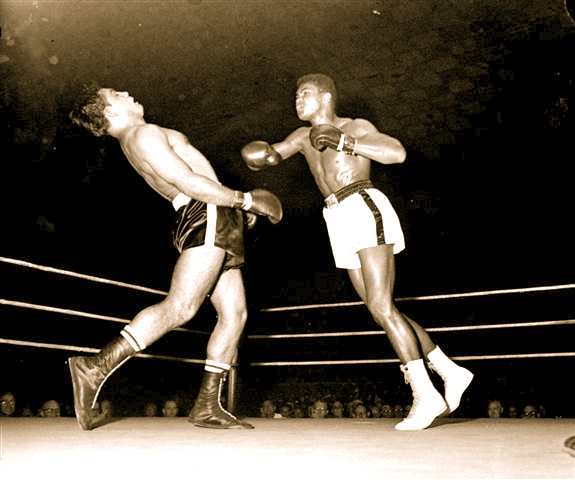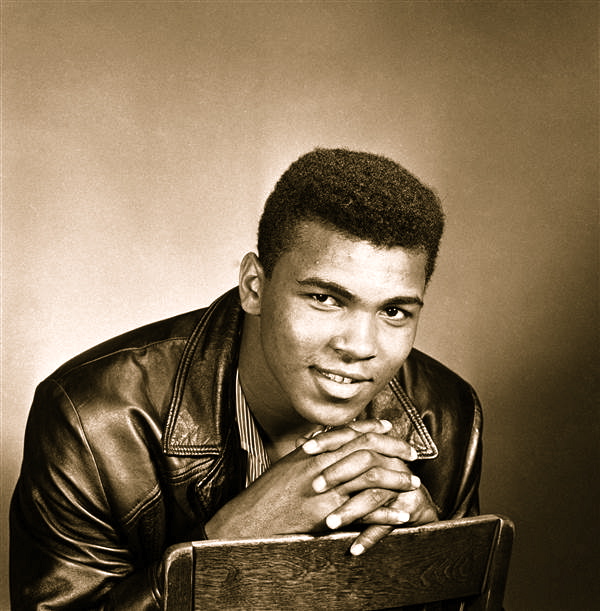“The Greatest”

“The Greatest”: Ishmael Reed on the Untold History of Muhammad Ali
We talk about the life and legacy of boxing champion and activist Muhammad Ali with educator and writer Ishmael Reed, author of the book, “The Complete Muhammad Ali,” which was published last year. Reed is a recipient of the MacArthur “genius” award and is currently a visiting scholar at the California College of the Arts.

AMY GOODMAN: This is Democracy Now!, democracynow.org, The War and Peace Report. I’m Amy Goodman. To talk more about the life and legacy of Muhammad Ali, we are joined by two guests. Ishmael Reed, educator, writer, activist, his new book is The Complete Muhammad Ali. Reed is recipient of the MacArthur “genius” award and is currently a visiting scholar at the California College of the Arts. And in New York, we’re joined by poet and professor Elizabeth Alexander. She’s the director of Creativity and Free Expression at the Ford Foundation, former chair of African American Studies at Yale University, author of the poem “Narrative: Ali,” written from the perspective of Muhammad Ali. Elizabeth Alexander recited the inaugural poem when President Obama first took office in 2009.
We welcome you both to Democracy Now! Ishmael Reed, why don’t we begin with you? Can you start off by sharing your reaction to hearing of the death of Muhammad Ali? And talk about why you spent years researching his life.
ISHMAEL REED: Well, I think that his death sort of represents a great tragedy, because this is a man who stayed in the ring too long, was abandoned by his entourage, was broke and suffering from brain damage when he fought his last two fights, according to Angelo Dundee, his trainer. It’s a great tragedy. And without the intervention of his current wife, I think he might be—might have died a long time ago. So, I’m very skeptical about this adulation that’s happening now, because none of those people who are praising him wanted to rescue him or tried to intervene when, for example, he was suffering horrible physical damage from taking punches from people like Larry Holmes. So I think that this is a great tragedy.
I think that not enough attention has been given to the influence of the Nation of Islam on Muhammad Ali. You played some of his speeches. Those speeches were taken right out of Elijah Muhammad’s Message to the Blackman. So I think that this is the great flaw in what I’m hearing from commentators about his death, is that without the Nation of Islam, nobody would have ever heard of Muhammad Ali.
 AMY GOODMAN: Ishmael, can you start off by giving us a thumbnail sketch of Muhammad Ali’s life?
AMY GOODMAN: Ishmael, can you start off by giving us a thumbnail sketch of Muhammad Ali’s life?
ISHMAEL REED: Well, he grew up in a middle-class home. His father, Cash, was a great provider. He was a man who earned a living by painting signs. I went to Louisville and talked to some of the people who knew Muhammad Ali when he was growing up. So he lived a relatively comfortable life. I also interviewed Rahman, his brother, who said the same thing, that they were provided for. And I’m always sort of like offended by the fact that some of the biographers of Muhammad Ali dismiss Cash as some kind of an alcoholic or some ne’er-do-well. This is a man who lived up to his responsibilities.
I interviewed Ed Hughes, the late Ed Hughes, who was Muhammad Ali’s oldest friend, and he talked about how Muhammad Ali had the gift of gab and could spout and express himself and how he’s very generous, would give people whom he didn’t know—for example, in the Philippines, he gave a man $25,000. So he’s very generous with his money and with, you know, giving to charities. So I think he’ll be remembered as somebody with a big heart.
But on the other hand, he had, you know, hangers-on and parasites and people who would con him, took his money, got him involved in criminal enterprises, used his name. So this is a great tragedy. This is a kid who had a big heart and was just exploited, all the way up to the last fight or the second-to-last fight, when he fought Larry Holmes, where he was shortchanged money that was owed to him for that fight. And the attorney who was suing Don King, when he heard that Muhammad Ali was swindled, he burst out into tears. So it’s a sad story.
AMY GOODMAN: In 1964, Malcolm X spoke out in support of Muhammad Ali after the press began to attack him for joining the Nation of Islam.
MALCOLM X: Well, he’s never been involved in any trouble. His record is clean. He’s actually an all-American boy, or an all-African boy, as you will. And an effort on the part of the press to attack him actually hurts America all over the world. I’ve gotten letters from countries myself, foreign countries, expressing confidence and pride in the clean image that Cassius represents. And I think to attack him, especially on religious grounds, would be most destructive to America’s image abroad. My advice always to Brother Cassius is that he never do anything that will in any way tarnish or take away from his image as the heavyweight champion of the world, because I frankly believe that Cassius is in a better position than anyone else to restore the—a sense of racial pride to not only our people in this country, but all over the world. And he is trying his best to live a clean life and project a clean image. But despite this, you find the press is constantly trying to paint him as something other than what he actually is. He doesn’t smoke, he doesn’t drink. In fact, if he was white, they would be referring to him as the all-American boy, like they used to refer to Jack Armstrong.
AMY GOODMAN: So that’s Malcolm X talking about Muhammad Ali, the fact that he had converted. Ishmael Reed, over the weekend, you know, the media was filled with images and discussions of Muhammad Ali, and there were a number of photos that would go by of him standing with Malcolm X, but there was almost no reference. I mean, I didn’t see any reference to that relationship. Talk about his decision to join the Nation of Islam, his relationship with Malcolm X.
ISHMAEL REED: Well, you know, I think it’s a mistake to say that Malcolm X recruited Muhammad Ali for the Nation of Islam. Actually, it was a man named Abdul Rahman, whose name before that was Sam X. Muhammad Ali saw Rahman selling copies of Muhammad Speaks in Florida and approached him and told Rahman that he had been reading Muhammad Speaks. And it was Rahman who invited him into the Nation.
Now, many people talk about that famous expression, “No Vietnamese ever called N-word,” as they say nowadays. That was created by Rahman. They were at a house. The Muslim women were cooking for the gathering there, and the reporters were outside. Ali comes in and says—asks Rahman what he should tell them. And Rahman says, “Tell them that no Vietnamese ever called you nigger.” And so, that’s one of the mythologies that we hear about Ali’s career.
Now, back up some, he also was following the precedent of Elijah Muhammad, who’s some sort of bogeyman, even though he organized people, brought in $70 million a year, started cattle farms, which were sabotaged by racists, and was engaged in international trade. I mean, there was the other side to it, I mention that, the criminals who were involved in the Nation of Islam. But Elijah Muhammad refused to fight in World War II. He was a conscientious objector in World War II, because he would not fight the Asiatic black man. This is where Ali gets his idea of not fighting the Vietnamese. As a matter of fact, Elijah Muhammad went around the country making pro-Japanese speeches. They tried to get him for sedition. They couldn’t get him for sedition, so they got him as a draft dodger, and he spent five years in prison. So, a lot of people don’t understand that when the Japanese Navy defeated what was considered a white nation, the Soviet Union, in 1905—or Russia, tsarist Russia, excuse me, in 1905, there was rejoicing all over the country. People like W. E. B. Du Bois, George Schuyler and others praised this as a victory of a black nation over a white nation, imperialist nation. So, this is the kind of background that led to Muhammad Ali refusing to fight in the Vietnam War.
AMY GOODMAN: This is a clip from the documentary The Trials of Muhammad Ali, featuring Abdul Rahman Muhammad, who helped introduce Ali to the Nation of Islam.
http://www.democracynow.org/2016/6/6/the_greatest_ishmael_reed_on_the

